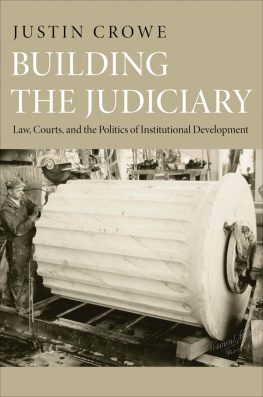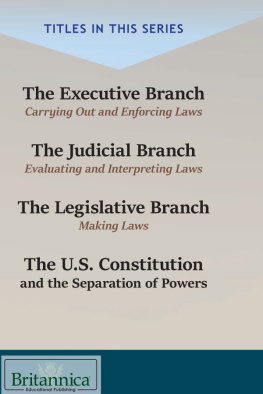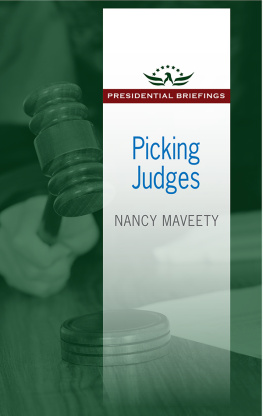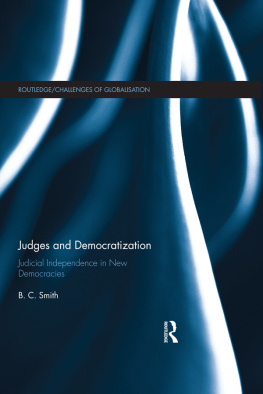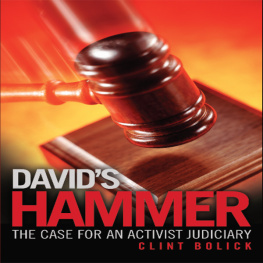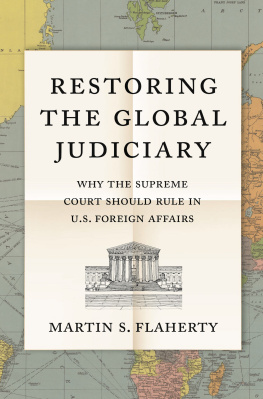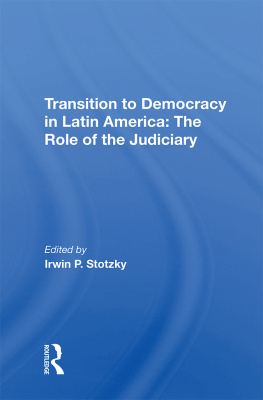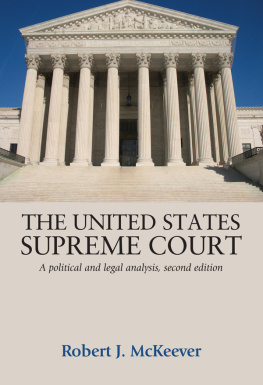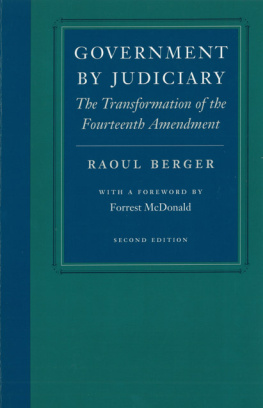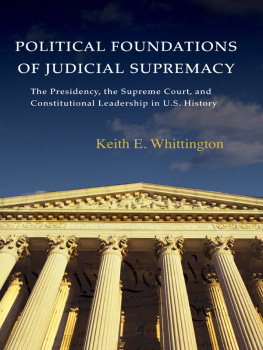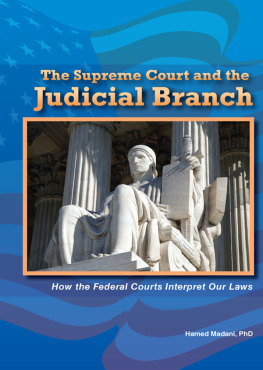BUILDING THE JUDICIARY
Princeton Studies in American Politics:
Historical, International, and Comparative Perspectives
Ira Katznelson, Martin Shefter, and Theda Skocpol, Series Editors
Note: the list of series titles is continued at the back of this book
Three Worlds of Relief: Race, Immigration, and the American Welfare State from the Progressive Era to the New Deal by Cybelle Fox
Building the Judiciary: Law, Courts, and the Politics of Institutional Development by Justin Crowe
Still a House Divided: Race and Politics in Obamas America by Desmond S. King and Rogers M. Smith
The Litigation State: Public Regulations and Private Lawsuits in the United States by Sean Farhang
Reputation and Power: Organizational Image and Pharmaceutical Regulation at the FDA by Daniel Carpenter
Presidential Party Building: Dwight D. Eisenhower to George W. Bush by Daniel J. Galvin
Fighting for Democracy: Black Veterans and the Struggle against White Supremacy in the Postwar South by Christopher S. Parker
The Fifth Freedom: Jobs, Politics, and Civil Rights in the United States, 19411972 by Anthony Chen
Reforms at Risk: What Happens after Major Policy Changes Are Enacted by Eric Patashnik
The Rise of the Conservative Legal Movement: The Long Battle for Control of the Law by Steven M. Teles
Why Is There No Labor Party in the United States? by Robin Archer
Black and Blue: African Americans, the Labor Movement, and the Decline of the Democratic Party by Paul Frymer
Political Foundations of Judicial Supremacy: The Presidency, the Supreme Court, and Constitutional Leadership in U. S. History by Keith E. Whittington
The Transformation of American Politics: Activist Government and the Rise of Conservatism edited by Paul Pierson and Theda Skocpol
Disarmed: The Missing Movement for Gun Control in America by Kristin A. Goss
Filibuster: Obstruction and Lawmaking in the U.S. Senate by Gregory Wawro and Eric Schickler
Governing the American State: Congress and the New Federalism by Kimberley S. Johnson
What a Mighty Power We Can Be: African-American Fraternal Groups and the Struggle for Racial Equality by Theda Skocpol, Ariane Liazos, and Marshall Ganz
When Movements Matter: The Townsend Plan and the Rise of Social Security by Edwin Amenta
Shaping Race Policy: The United States in Comparative Perspective by Robert C. Lieberman
How Policies Make Citizens: Senior Political Activism and the American Welfare State by Andrea Louise Campbell
Dividing Lines: The Politics of Immigration Control in America by Daniel J. Tichenor
Managing the Presidents Program: Presidential Leadership and Legislative Policy Formulation by Andrew Rudalevige
Shaped by War and Trade: International Influences on American Political Development edited by Ira Katznelson and Martin Shefter
Dry Bones Rattling: Community Building to Revitalize American Democracy by Mark R. Warren
Disjointed Pluralism: Institutional Innovation and the Development of the U.S. Congress by Eric Schickler
The Forging of Bureaucratic Autonomy: Reputations, Networks, and Policy Innovations in Executive Agencies, 18621928 by Daniel P. Carpenter
Copyright 2012 by Princeton University Press
Published by Princeton University Press, 41 William Street, Princeton, New Jersey 08540
In the United Kingdom: Princeton University Press, 6 Oxford Street, Woodstock,
Oxfordshire OX20 1TW
press.princeton.edu
All Rights Reserved
Library of Congress Cataloging-in-Publication Data
Crowe, Justin, 1981
Building the judiciary : law, courts, and the politics of institutional development / Justin Crowe.
p. cm. (Princeton studies in American politics : historical, international, and comparative perspectives)
Includes index.
ISBN 978-0-691-15292-9 (hardcover : alk. paper) ISBN 978-0-691-15293-6 (pbk. : alk. paper)
1. CourtsUnited StatesHistory. I. Title.
KF8719.C76 2012
347.73109dc23
2011030845
British Library Cataloging-in-Publication Data is available
This book has been composed in Minion
Printed on acid-free paper.
Printed in the United States of America
10 9 8 7 6 5 4 3 2 1
ACKNOWLEDGMENTS
For all the important things about which my wife and I agree, we disagree about acknowledgmentsnamely, I read them, she does not. For her, acknowledgments are nothing more than a waste of time; for me, they are the essential starting point of any book. After all, while books are about ideas, they are written by peoplepeople whose voices become professional and academic while writing, but people whose lives occur in a rich and complex world from which the reader is wholly excluded. Acknowledgments are the one instance in which readers see authors as peopleas mothers and fathers, husbands and wives, friends and colleagues; they are the one instance in which authors offer a glimpse of something more than their scholarly pronouncements. These glimpses, I know from recounting my own favorite acknowledgments, come in many shapes and sizesfrom amusing anecdotes that illuminate or epitomize the books origins (James Morones Hellfire Nation) to touching meditations about those who have made the long nights of writing durable (Julian Zelizers On Capitol Hill) to paeans to those whose ideas have encountered, collided with, and shaped the authors own in meaningful ways (Mark Grabers Dred Scott and the Problem of Constitutional Evil). I am not sure where my acknowledgments fit along that spectrum or how they measure up to Morones, Zelizers, or Grabers, but I have enjoyed writing them nonetheless. If the eight chapters that follow are systematic analysis, then these next several pages are joyous remembrance.
Gary Jacobsohnmore than deserving of first position in any accounting of my intellectual influencesset me on the path to studying the American Constitution and Supreme Court at Williams College more than a decade ago, and, though nothing in here emerged directly out of any conversation I had with him, neither would anything in here exist were it not for him. The more proximate (but by no means more important) source of the spark that became this book came from a group of my Princeton University precept studentsspecifically Tyler Allard, Anne Louise Bigliani, Jesse Creed, David Korn, Eryck Kratville, and Josh Waldman, all of whom made a habit of asking questions for which I was largely without answers. As I worked my way toward those answers, Paul Frymer nurtured a nascent idea and thankfully confirmed that it could sustain a project (rather than just a seminar paper) all its own; Ken Kersch offered enthusiasm, encouragement, and edifying conversation, usually while treating me to lunch in or around Princeton in the process; draw upon material published in Studies in American Political Development 24, no. 1 (2010): 90120, and the

